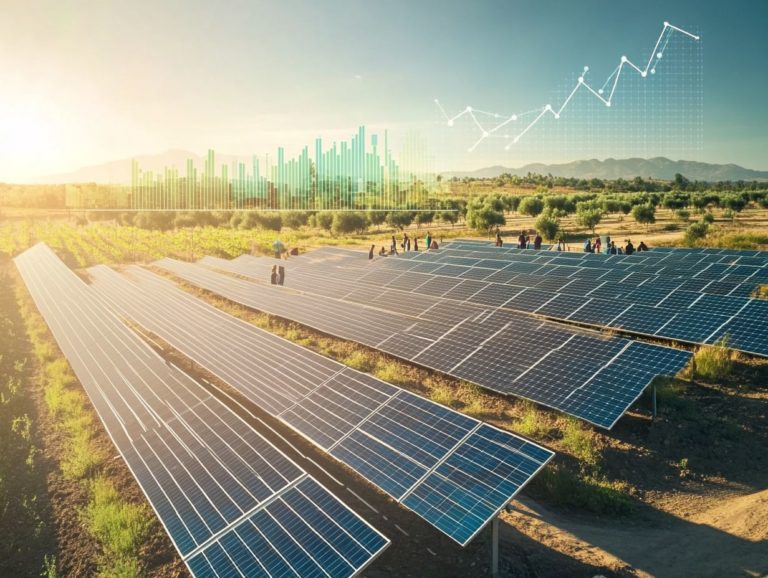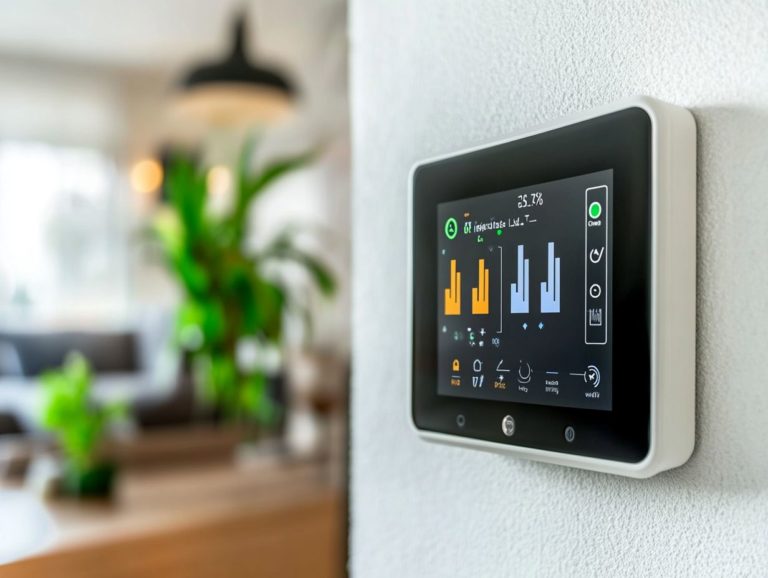What are the Benefits of Home Energy Storage?
As energy costs keep climbing and the demand for sustainability intensifies, you will find that home energy storage systems are emerging as a favored solution for discerning homeowners like yourself.
These systems help you cut down on energy expenses. They also provide a reliable backup power source during outages, giving you peace of mind in those unexpected moments.
With options ranging from battery storage to thermal systems, you have various energy storage solutions at your fingertips. This makes it simpler to harness and retain energy efficiently.
Unlock the myriad advantages, different types, and essential considerations when installing a home energy storage system. Act now to revolutionize your energy management!
Contents
Key Takeaways:
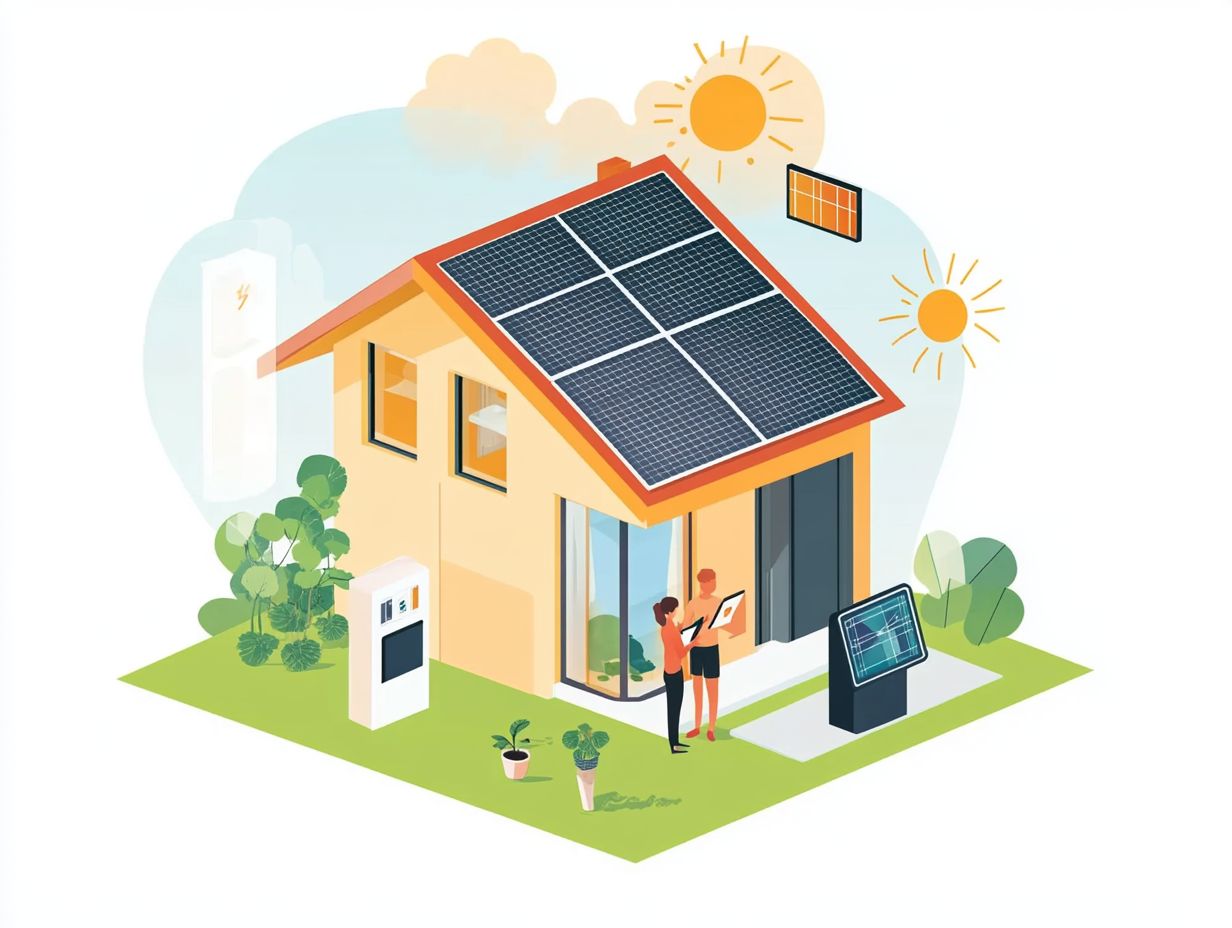
Home energy storage can significantly reduce energy costs by storing excess energy during off-peak times and using it during peak times when electricity rates are higher.
Installing a home energy storage system provides backup power during outages and contributes to emergency preparedness, making it a reliable and efficient energy source.
Home energy storage systems have environmental benefits, such as reducing dependence on fossil fuels and contributing to a cleaner, more sustainable energy future.
What is Home Energy Storage?
Home energy storage encompasses systems that empower you to store energy generated from renewable sources, such as solar power, for later use. This enhances your energy usage and propels you toward greater energy independence.
These systems can integrate various technologies, including lithium-ion batteries, thermal storage, and micro-scale storage solutions. They provide backup power during outages, minimize energy costs, and address sustainability concerns by reducing your reliance on the grid.
Integrate solar panels with storage solutions to capture energy on sunny days. Store it for use during peak hours or less favorable weather, significantly optimizing your energy usage.
Key components of these systems typically include inverters, charge controllers, and monitoring systems. These are designed to ensure efficient operation and effective energy distribution. The perks of achieving energy independence are plentiful: gain resilience against power outages and shield yourself from the volatility of energy prices.
Managing your energy usage effectively leads to long-term savings. It also reinforces your commitment to sustainable living, making this a savvy investment for those who prioritize environmental responsibility.
Advantages of Home Energy Storage
Home energy storage presents a wealth of benefits for you. Picture saving a lot on your energy bills while having a dependable power supply during outages and effectively managing your energy costs by harnessing stored solar power.
This enhances your energy efficiency and plays a vital role in fostering a more sustainable energy system.
Reducing Energy Costs
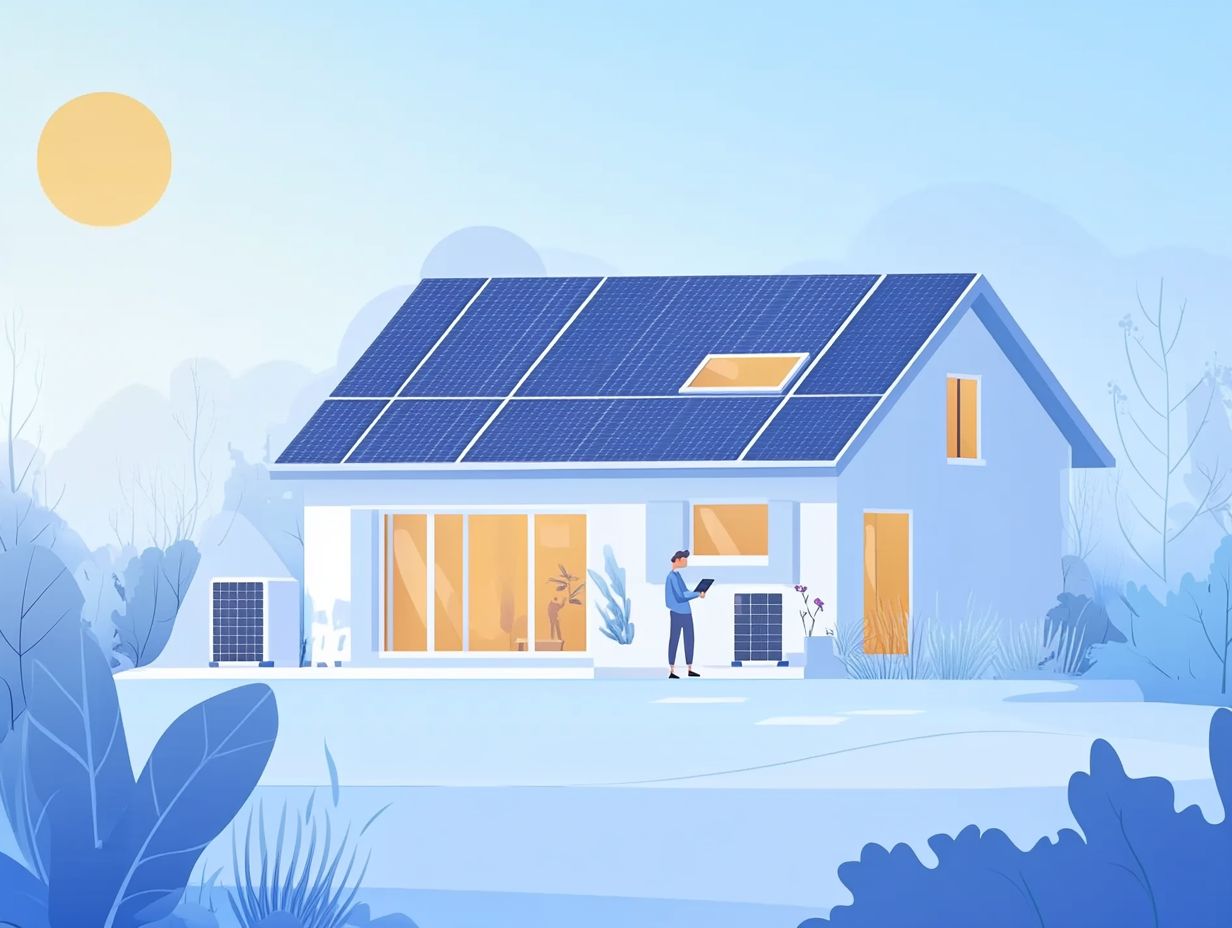
By implementing home energy storage systems, you can significantly reduce your energy costs through enhanced self-usage. This allows you to store the excess energy generated by your solar panels and use it during peak demand hours.
This approach maximizes your solar energy efficiency and balances grid load, leading to overall energy savings.
For example, utilizing energy management software can further optimize your energy use by providing real-time consumption data. This makes it easier for you to identify usage patterns and adjust your habits accordingly.
A study conducted by the National Renewable Energy Laboratory found that households incorporating energy storage systems experienced reductions in energy costs by up to 30%. Such statistics highlight the importance of being proactive in managing your energy consumption effectively.
Backup Power and Emergency Preparedness
Home energy storage systems are your dependable ally during unexpected power outages. They ensure that your essential appliances stay operational and boost your overall emergency preparedness.
When you integrate these systems with your solar power setup, they switch to backup mode. This provides uninterrupted power access even when the grid falters.
The value of having a battery storage solution goes beyond mere convenience; it offers vital support during extreme weather events when utility companies often struggle to restore power.
Take, for example, a family that relied on their backup system to keep their refrigeration running and medical devices powered during a prolonged outage after a hurricane. By providing peace of mind and allowing you to maintain daily routines, these setups are crucial for protecting lives and livelihoods.
Environmental Benefits
Adopting home energy storage plays a pivotal role in reducing your environmental impact. It promotes the use of clean and renewable energy sources while significantly minimizing the carbon footprint tied to traditional energy systems.
By harnessing the ability to store excess energy generated from your solar panels during the day, you can tap into this green energy during peak hours. This effectively lessens your reliance on fossil fuels.
Research indicates that integrating energy storage solutions could potentially reduce greenhouse gas emissions by over 30% by 2030, according to a report from the International Renewable Energy Agency. As more households invest in these systems, the demand for fossil fuels decreases.
This creates a ripple effect that encourages utilities to accelerate the shift toward a more sustainable energy grid.
Types of Home Energy Storage Systems
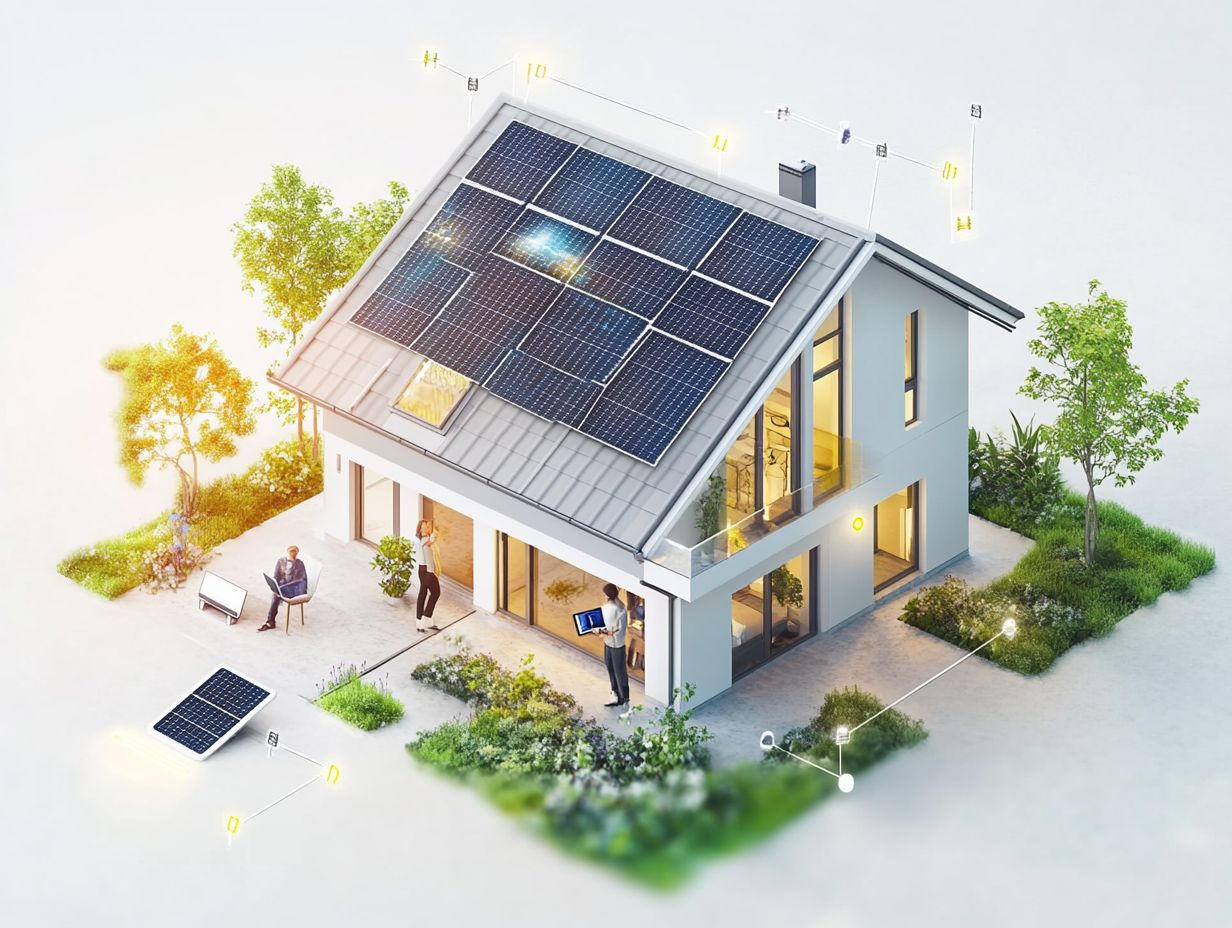
You ll find a variety of home energy storage systems available in the residential market today. Options include:
- Battery storage systems: such as lithium-ion batteries, which are effective for optimizing energy usage.
- Thermal storage solutions: systems that store heat for later use, enhancing energy efficiency.
- Pumped hydro storage: a method that uses water to generate electricity during high demand.
Each type presents unique advantages for managing and optimizing your energy use.
Battery Storage
Battery energy storage systems, especially those powered by lithium-ion technology, represent one of the most effective solutions for optimizing energy usage. They enhance energy efficiency in your home.
These systems excel at capturing excess energy generated from renewable sources like solar panels. This allows you to harness that energy during peak demand times or when the sun takes a break.
Typically, these batteries boast a lifespan of 10 to 15 years, depending on how you use and maintain them. They achieve efficiency rates that often exceed 90%, meaning a significant portion of the stored energy is readily available for your use.
Top-tier brands like Tesla and Enphase Energy set high standards to provide high-performance solutions specifically designed for residential applications.
Recent trends indicate a rising interest in battery storage as homeowners increasingly seek to bolster energy independence and mitigate electricity costs in a landscape marked by unpredictability. Imagine harnessing energy while saving money! These systems are revolutionizing how we manage our power.
Thermal Storage
Thermal storage systems are your ally in harnessing excess thermal energy for later use. They are key players in energy management strategies designed to enhance efficiency and tackle sustainability concerns within residential spaces.
By capturing heat from various sources be it solar panels or off-peak electricity these systems store that energy in mediums like water or phase-change materials. This allows you to tap into this reservoir whenever you need it.
This approach helps manage your energy costs and cuts down your reliance on conventional electricity during peak hours when rates soar.
Unlike battery storage, which focuses solely on electrical energy, thermal storage offers a distinctive solution for those aiming to improve heating and cooling efficiencies.
For instance, installing a water tank as a thermal reservoir enables you to utilize solar energy effectively, providing hot water on demand when the sun sets. Systems like ice storage chillers can keep your home cool, shifting energy consumption to cooler nighttime hours.
Pumped Hydro Storage

Pumped hydro storage is a powerful method that stores and releases energy using gravity. It helps stabilize the grid and makes energy distribution more reliable.
This system uses two water reservoirs at different heights. When there’s excess energy, water is pumped uphill. During peak demand, this water flows back down to generate electricity.
One major advantage is its ability to support large energy needs. It balances renewable sources like solar and wind, allowing homeowners to store extra energy and contribute to a sustainable energy future.
Pumped hydro storage is essential for a greener tomorrow.
Factors to Consider Before Installing Home Energy Storage
Before diving into home energy storage, ask yourself key questions about cost and benefits! Understanding these factors helps you achieve the best performance for your home.
Cost and Return on Investment
Understanding the costs tied to home energy storage systems and calculating your potential return on investment is crucial for maximizing energy savings and managing energy prices.
These systems allow you to store excess energy from renewable sources like solar panels. While they often require a significant upfront investment, the long-term financial benefits can be substantial.
Evaluate various technologies, like lithium-ion batteries versus lead-acid options, to make informed choices based on efficiency, capacity, and lifespan.
Be sure to factor in installation costs, maintenance expenses, and potential resale value when analyzing your total expenditure.
To optimize your ROI, consider your energy consumption patterns and weigh peak versus off-peak rates. This ensures your energy storage solution aligns seamlessly with your daily usage.
Compatibility with Existing Systems
Before installing a home energy storage system, assess its compatibility with your existing energy systems, such as solar panels. This step is crucial for effective energy management and optimized distribution.
Conduct a thorough examination of your current setup, including energy consumption patterns and the total generation capacity of your solar panels. Be aware of potential challenges, such as voltage mismatches or insufficient battery capacity, which can lead to inefficient energy usage.
To address these issues, consider using an inverter to bridge voltage discrepancies or upgrading your solar panels to enhance energy production.
Consulting with professionals who can perform a comprehensive energy audit will help ensure that your storage system integrates seamlessly without compromising overall performance.
Frequently Asked Questions
What are the Benefits of Home Energy Storage?
Home energy storage offers several benefits for homeowners, including:
- Reduced energy costs by utilizing stored energy during peak rate hours.
- Increased energy independence by relying less on the grid.
- Backup power during outages and emergencies.
- Reduced carbon footprint and environmental impact.
- Ability to store excess energy from renewable sources.
- Greater control over energy usage and management.

